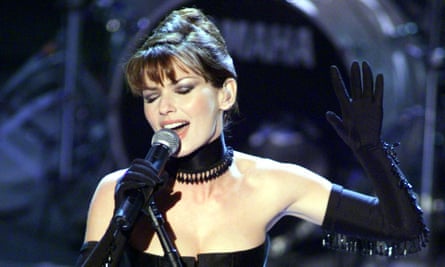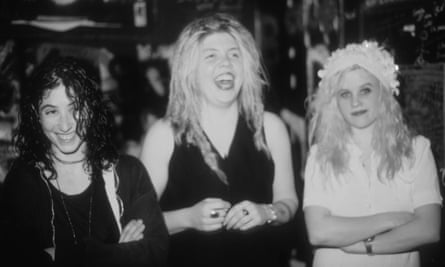In the past few years, a wave of documentary films have revisited the lives of famous (or infamous) women of the 90s, examining how their careers exploded under the weight of misogyny and undue media scrutiny: beginning, perhaps, with the 2017 Lorena Bobbitt docuseries, and spanning Anita Hill in Speaking Truth to Power, the righteous exposé of Finding Britney, Monica Lewinsky in 15 Minutes of Shame, and Netflix’s new Pamela Anderson doc. The podcaster Yasi Salek has termed this cottage industry/genre “We’re Sorry” docs. Conveniently, “We’re Sorry” docs serve both the millennial need for accountability over the toxic culture they were raised in, and allow for some Gen X cultural sin-eating for not caring earlier, having come up in a time where any beautiful blonde on TV was deemed a “bimbo” and any woman aspiring to fame deserved whatever she got.
Yet, as moving and necessary as all these documentaries are, there is little in the way of recourse. The sanctity of these women’s careers and lives is already spent, with empathy and hand-wringing mea culpas coming only in retrospect. How do we rectify this? How do we set about properly appreciating and seeing women’s ambitions now?
I have worked as a music critic for the past 20 years, and spent the last five as a documentarian making film, TV and podcasts that focus on understanding women’s ambitions in music: what drives them, their artistic self-conception, the onus for their work and, perhaps most importantly, what their work endows. I want all of this in their words, I want it in their voices. As a fan, since my teenage days I have hungered for women’s voices. Whether they were softly soulful or artful screams, seeing and hearing other women is what gave me a sense I belonged in music, too. Their presence was my permission: early 90s bands like Huggy Bear and Babes in Toyland were my church, and my career as a critic came out of eager punk evangelism. For me, there was liberation to be had for those desperately seeking songs of girl possibility, of girl power. I wanted to spread the good word.
It has been 70 years since Big Mama Thornton put Hound Dog on the American charts, yet the primacy of women’s roles in popular music is still woefully underchronicled and undercredited, ever-shadowed by Great Man legacies that blot out women’s innovation. Perpetual outsiders, women are somehow forever arriving, forever an insurgent force, rather than rightly credited as totemic figures who shaped every facet of rock, blues, soul, country, jazz, the avant garde, hip-hop, disco, punk, new wave and whatever you’re likely listening to now.
All that vital lived history is so rarely told by the women who lived it. I have seen far too many documentaries where women artists offer compelling testimony of their creative mission, only to be followed by an A&R guy or a name brand industry titan whose account is offered as if to verify her truth. Yet, as anyone who loves music and studies popular music history knows, the industry men have their own ideas about who is deemed a real artist, who counts as canonical, with standards long tainted by sexism, racism, homophobia and mythology that largely served to bolster their authority.
All of these known knowns, this hunger, this desire to know what women artists experienced is what informed my work as a director on the four-part docuseries Women Who Rock. I made the conscious choice to exclude the opinions and accounts of those titanic men, and show women artists as the reliable narrators of their own history, of music history itself.

In the series, the stories of women such as Chaka Khan, Shania Twain, Aimee Mann, Kelis and Nancy Wilson of Heart reveal the truths of women’s lives in the music industry. That the fights were most often with these men. That these women found inspiration and solace in the work of their peers and primogenitors – despite encountering industry insistence that women view each other as competitors, in the hope they would battle each other over limited playlist spots, rather than turn their sights on an industry that sidelined them. Rather than regard each other as territorial enemies, the 41 artists featured in Women Who Rock tell us stories of mentorship and standing on the shoulders of the women that came before, of how they derived power from other women’s work.
after newsletter promotion
Nona Hendryx of LaBelle speaks of what it meant to be mentored at the age of 19 by the great Nina Simone. Legendary background singer Merry Clayton (that’s her murderous holler on Gimme Shelter) illuminates how Odetta guided her through her career. Chaka Khan speaks of Joni Mitchell’s lyrical wisdom bringing her back from the brink of grievous self-harm. The Bangles’ Susanna Hoffs lays the rumoured feud with the Go-Go’s to rest with a story of how they inspired her to start her own band. Joan Jett talks about all that Debbie Harry gave her as a friend and role model, an example of a woman in music blazing a path of her own design.
I can only take so much directorial credit for capturing this – these stories were already there. These artists eager to account for their drive, their self-conception, their love of what they do and what they endured in making their work a reality. While we tackle their truth and their travails, personal and professional, these women – as artists – and we as their collective fans and audience deserve stories of women’s experiences that aren’t seen solely through what the critic Niko Stratis has called “the prism of trauma”.
I want us to know these stories and hail this matrilineage for all it is – righteous, real and inspiring. Now, while they are here, so that we don’t have to keep saying “we’re sorry”.

